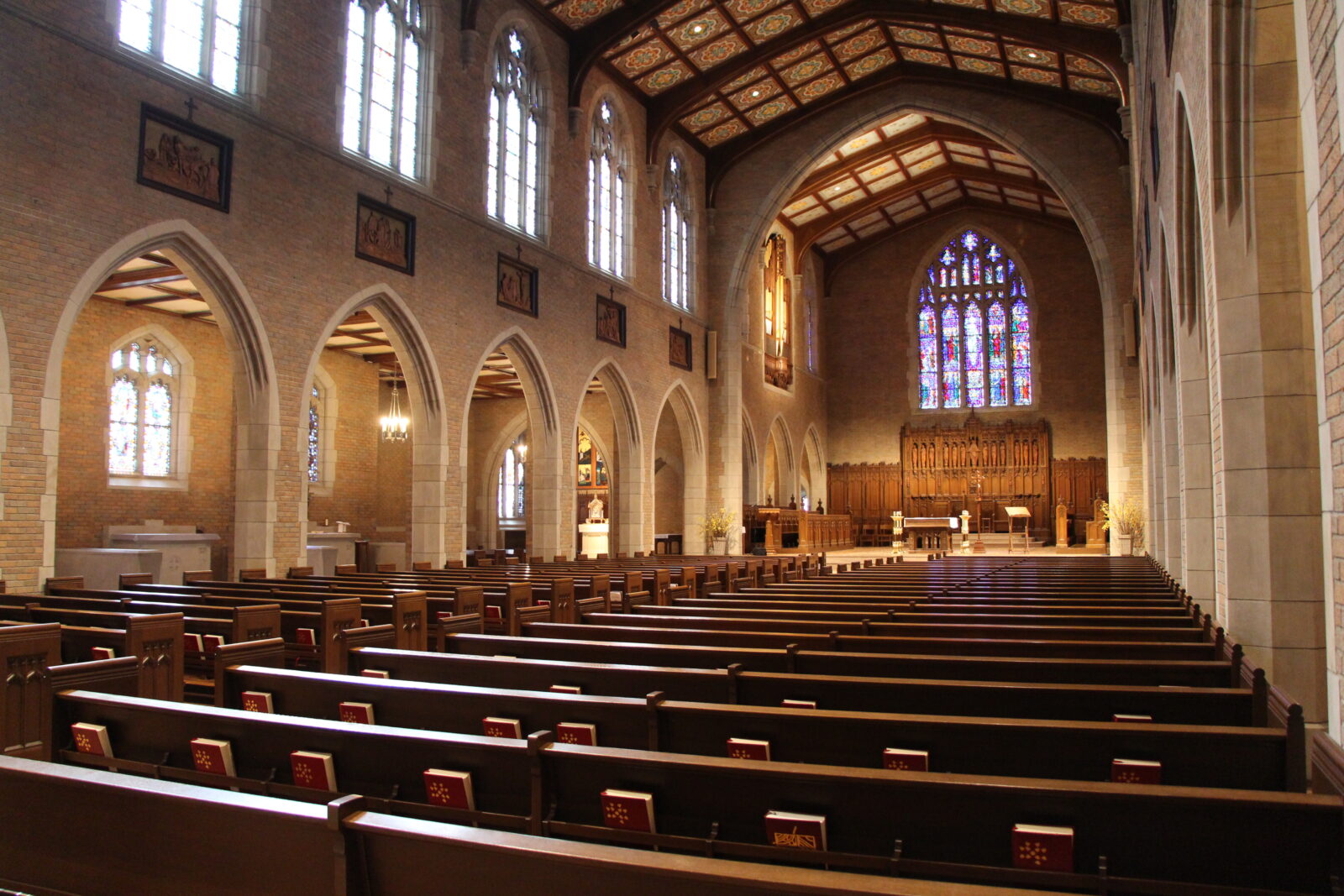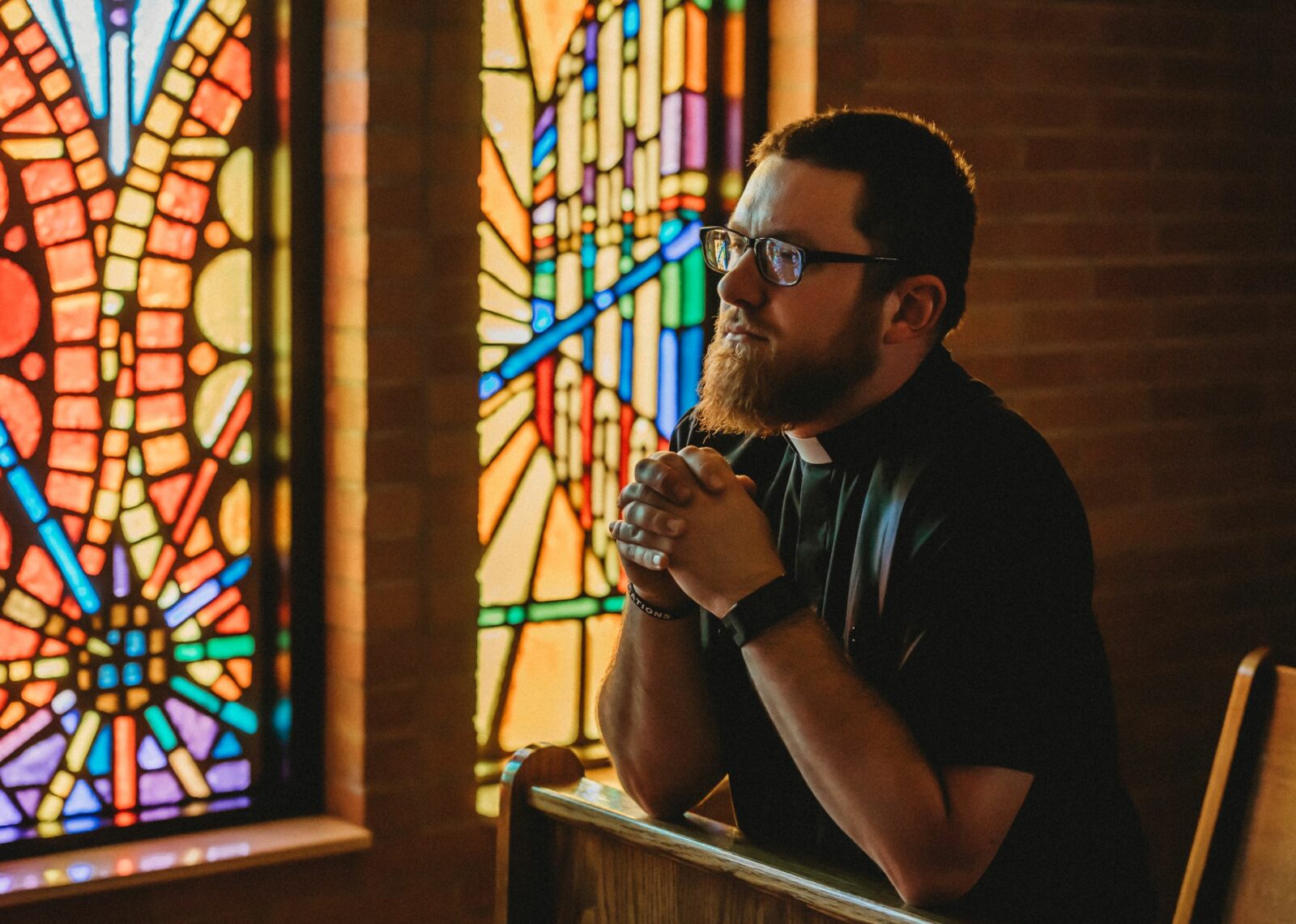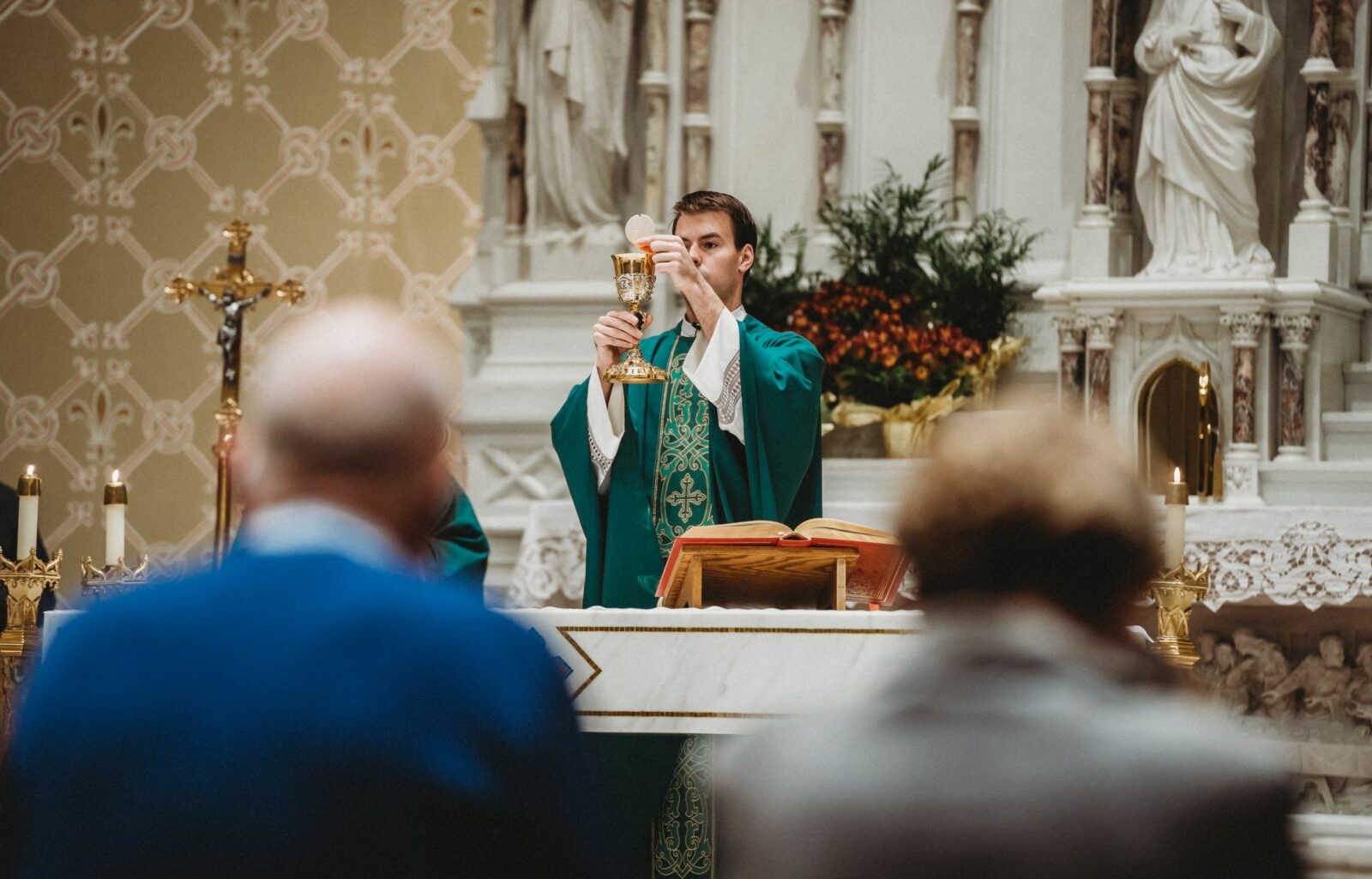FAQs about Seminary
Posted in Explore More, Frequently Asked Questions, Seminarian Life
WHAT IS SEMINARY?
Seminary: A school for the spiritual and academic preparation of candidates for the priesthood
St. John Paul II describes seminary formation as “a continuation in the Church of the apostolic community gathered about Jesus, listening to his word, proceeding towards the Easter experience, awaiting the gift of the Spirit for the mission.” – PPF 7
When Jesus called His apostles, the first priests, to “follow me”, He formed the first seminary. The seminary is a house of formation where men who are discerning a vocation to the priesthood are formed into holy and dedicated priests. The four pillars of formation in the seminary are: Spiritual, Human, Intellectual, and Pastoral. Ultimately, the seminary is filled with joyful men eager to respond to the Lord’s call.
WHAT IS A SEMINARIAN?
A seminarian is a man who is discerning the Lord’s call to the ministerial Roman Catholic Priesthood. By virtue of his baptism, he is a member of the priesthood of all believers. The seminarian hears the Lord speaking to him and calling him to a fuller participation in the priesthood, by becoming a priest of Jesus Christ. While the priesthood has many elements that make it like a job, it is ultimately a vocation: a calling from the Lord. The seminarian then needs to be open to hearing the Lord’s call in his life and be eager to respond to it.
A man who enters the seminary does not possess all the answers. In fact, many more questions will arise from time spent in seminary formation! Seminarians come from all walks of life, previous educational experiences, family backgrounds and parishes. They bring different talents, insights, and experiences to their time in formation. In the Program for Priestly Formation, the bishops write:
“All applicants should give witness to their conviction that God has brought them to the seminary to discern whether or not they are really called to the priesthood, and they should commit themselves wholeheartedly to carrying out that discernment.” – PPF 45
Seminarians live in community. This means they pray together, work together, eat together, and study together. While the seminary is a place where individual men go to discern what the Lord is asking of them, ultimately as priests they will belong to a fraternity. The seeds of this brotherhood and fraternity are sown during time in seminary formation. Again, from the Program for Priestly Formation:
“The essential work of the seminary takes place in the context of community. Personal growth and character development should progress together harmoniously within a deepening spiritual life. The seminary is a school of human virtue, of growth in honesty, integrity, intellectual rigor, hard work, and tolerance, where the common good is built with solidarity and discipline — all leavened by humor and healthy enjoyment. The seminary also must be a school of spiritual growth in which seminarians are formed into men of prayer, imbued with those virtues that only grace can bring: faith, hope, and charity. The seminary should help the seminarians develop the relationship and dialogue skills necessary for healthy interpersonal relationships as priests.” – PPF 260
To gain more information about seminarians, please know that you are always welcome to visit the seminary for a personal visit or tour with the Director of Priestly Vocations or for a more in-depth experience, by attending a Discernment Day (high school men, freshmen – seniors), or Discernment Weekend (for men, ages 18-55).
WHAT DOES A SEMINARIAN STUDY?
“Intellectual formation contributes to spiritual formation. The study of the traditions of faith and the experiences of faith among the saints and the people of God serves to deepen one’s own spiritual journey.” – Program of Priestly Formation 113
Men who enter a seminary come with a variety of educational backgrounds and experiences. Candidates for the priesthood range in age from 18 – 55. For any potential candidate for the priesthood in the Archdiocese of Detroit, their study and formation would take place at Sacred Heart Major Seminary.
Sacred Heart is located in Detroit and has been forming men for the priesthood since 1919. Sacred Heart offers both a fully accredited College of Liberal Arts and Graduate School of Theology.
A man with little or no previous college experience would complete a traditional four year Bachelor of Arts degree, while men who have already earned a Bachelor’s degree from another accredited academic institution, complete a two year Bachelor of Philosophy program, commonly referred to as Pre-Theology. For inquiries about how to apply to become a seminarian, please contact Fr. Craig Giera, Director of Priestly Vocations.
The Bachelor of Arts in Philosophy (A.B.)
A four year degree program consisting of 120 credit hours of study. This program is designed to serve men who have not yet earned a Bachelor’s Degree.
Courses Credits
Communication and Language Arts 9
Science and Mathematics 9
Social Sciences 9
Humanities 9
Music 5
Languages 15
Theology 13
Philosophy 40
Electives 11
The Bachelor of Philosophy (B.Phil)
A two year undergraduate degree program consisting of 67 credit hours of study. This program is designed to serve men who have already earned a Bachelor’s Degree and commonly referred to as Pre-Theology.
Courses Credits
Languages 9
Music 5
Theology 13
Philosophy 40
The study of philosophy prepares a man for further studies in theology. As the Program for Priestly Formation states:
“The study of philosophy is fundamental and indispensable to the structure of theological studies and to the formation of candidates for the priesthood. It is not by chance that the curriculum of theological studies is preceded by a time of special study of philosophy.” – PPF 152
The intellectual aspect of formation is complemented with the spiritual, human, and pastoral aspects which become the total formation program for a seminarian. These four areas of priestly formation are integrated through a seminarian’s entire time in the seminary. They are referred to as the Pillars of Formation and come from the Program for Priestly Formation.
After completion of one of the undergraduate degree programs: the four year Bachelor of Arts in Philosophy or the two year Bachelor of Philosophy (Pre-Theology), a seminarian would then advance to graduate studies in theology. A four year Master of Divinity program is then offered.
The goal of the Master of Divinity program is to build upon and continue to provide the necessary human, spiritual, theological, pastoral and priestly preparation for ordination to the Catholic priesthood and service to Christ and the Church.
The Master of Divinity (M.Div.)
A four year graduate program consisting of 123 credit hours:
Courses Credits
Church History 7
Patristics 5
Scripture 18
Systematics 23
Moral Theology 9
Liturgy and Sacraments 15
Applied Theology 12
Canon Law 5
Field Education 8
Integrating Studies 8
Music 1
New Evangelization 6
Electives 6
AM I READY FOR THE SEMINARY?
Entering the seminary is a big step in a man’s life, but it is also important to remember that it is also a small step at the same time. By deciding to enter the seminary, you are simply stating, “I feel the Lord is calling me to discern the vocation of priesthood.” This is a big step because you will have for the first time stated publicly that you are seeking to discern a priestly vocation. Friends and family will react in different ways to this declaration, but don’t let that worry you…..always remember the phrase most spoken in all of scripture, “Be Not Afraid!”
It is a small step, because you will have made no other commitment other than a willingness to spend the next year discerning a calling to the priesthood with the support and assistance of the seminary faculty, and your brother seminarians who both afford you the opportunity to no longer embark on this discernment alone.
If you discern, through the guidance of your spiritual director, that you are not called to the priesthood, what have you lost? A year or two, or three spent learning more about yourself, your spiritual life, your Church, your vocation….all this goes with you. If your discernment leads you to the sacrament of Holy Orders, you will have found your mission in life. Either way, it is a win-win, or as some would say, time well spent. Ask the vast majority of men who have spent time in the seminary discerning their vocation, and they will tell you it was some of the best years of their lives!
After spending time in prayer and reflection, asking the Lord what His will is for you, it can sometimes be helpful to “gauge” where you are in regards to your readiness for the seminary. While this is certainly not an exhaustive list not meant to be the final word on this matter, perhaps the provided questions might help you in that “gauging” process.
On each of the twenty points below, rate yourself on a scale from 0-5. A rating of 0 means you do not possess the stated sign at all. A 5 indicates that this sign is very evident in your life. The highest possible score is 100, so the closer you are to that number, the more prepared you may be for the seminary. Be completely honest with your answers and see where you fall in this hopefully helpful instrument. If you would like to follow-up with this through a discussion with the Director of Priestly Vocations, please feel free to contact him. He would be more than happy to help you discern the meaning of your answers.
______ 1. I love Jesus Christ, and I have a thirst to bring Jesus and His teaching to the world.
______ 2. I am endeavoring to be a believing, practicing Catholic Christian.
______ 3. I am trying to live a life of prayer, and I desire a life of prayer.
______ 4. I am trying to serve others, and I desire a life of service to others.
______ 5. I feel a desire to be a priest, though it is sometimes stronger than at other times.
______ 6. Others tell me that I should be a priest, or that I would make a good priest.
______ 7. Prayerful reading of Sacred Scripture leads me to believe I might be called to be a priest.
______ 8. I am endeavoring to live virtuously.
______ 9. I like to be around people, and I have sufficient social skills to engage others.
______ 10. I have enough intelligence to complete graduate-level coursework and function as a priest.
______ 11. I think I have the physical, emotional and psychological stability to become a priest.
______ 14. I believe that I have the self-mastery to be a man of prayer, leadership, sacramental sign, and manager of a parish.
______ 15. Generally speaking, I have demonstrated stability in my life.
______ 16. People who know me would say I am a Christian gentleman.
______ 17. I have had events happen in my life that seem to be signs pointing towards the diocesan priesthood.
______ 18. I am usually able to accept both success and failure without losing hope.
______ 19. I believe that I have a healthy psycho-sexual development and orientation.
______ 20. I am trying to be truly open to the will of God for my life.
* This discernment instrument is taken from: To Save a Thousand Souls: A Guide for Discerning a Vocation to Diocesan Priesthood., by Fr. Brett Brannen



